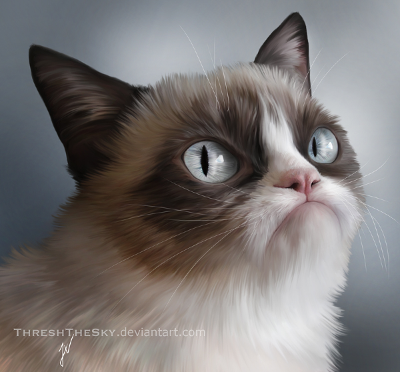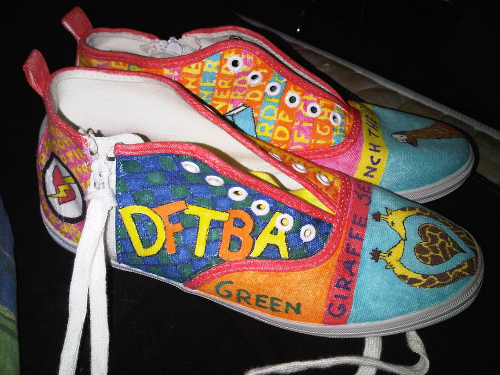We know you’re already sick of hearing about Tumblr porn and how Yahoo will keep the kids safe. Just think how actual Tumblr users feel.
Still, there’s one aspect of the $1.1 billion Yahoo-Tumblr deal that no one’s discussing: fandom. And it’s kind of a big deal.
The unspoken truth behind Yahoo’s much-touted bid to court Tumblr’s younger demographic is that for all intents and purposes, Tumblr culture is fandom culture. There are still plenty of other spaces where fandom exists, but we have never had such a megalithic and central social platform so visibly united under one umbrella.
Much of the conversation around Yahoo’s acquisition of Tumblr has been the question of how Yahoo will actually benefit from the experience. As Tumblr users spin doomsday scenarios of purple dashboards festooned with ads, Yahoo has stated that it will take a hands-off approach and work on helping Tumblr refine and enhance functionality, hopefully starting with its shaky internal search engine.
Even as Yahoo insists nothing will change, business analysts and media experts are speculating that the company intends to plumb Tumblr for its advertising potential.
But if that’s the case, Yahoo should know that when you market to fandom, you have to adopt a whole new way of thinking about marketing, brand advertising, and consumer loyalty.
Here are the basics.
1) Fandom culture values stories, not things.

Illustration by threshthesky.deviantART
One of the most prominent businesses currently attempting to capitalize on Tumblr’s native mobile advertising is Home Depot. Wielding an ugly orange cat as its mascot, it has boldly entered the Tumblr fray—only to suffer considerable backlash as Tumblr users reacted to the unwelcome presence of sponsored posts on their dashboards.
Since the sponsored posts began, however, Richard the Cat has had two notable viral posts: both fandom-related. One is a Game of Thrones joke; the other, participation in May the Fourth. Considering the typical post from richardthecat gets around 100 notes, the difference is striking. But it’s completely understandable when you realize that to the 80,000 people who enjoyed both posts, their emotional connection was to the fandom, not the cat.
But here’s how Home Depot can—and should—do it differently. Instead of making Richard the cat into a typical Internet meme, it should make Richard the Cat into a character Tumblr can love.
Sure, you might think that cats are a given win with Tumblr users—and it’s true, Richard the Cat has gotten some fans. But the massive love that the Internet has for Maru and Tardar Sauce, a.k.a. Grumpy Cat—the true stars of cat fandom—doesn’t come from a bunch of square pictures on Meme Generator. It comes from the fact that they are real cats with personalities we can see unfolding with every YouTube video. We love Maru because no human or animal has ever loved a box more, nor tried so diligently to squeeze into a tight space. And we love Tardar because we’ve all been judged unfairly by our appearances, and we all secretly yearn for someone to look past our frown and see the snuggly inner kitten just waiting to be hugged.
Maru and Tardar could sell us anything—not because they fit neatly into a marketing ploy, but because we already love them.
When the creators of The Lizzie Bennet Diaries gave Jane Bennet a Lookbook account, they did it as a way of providing extra insight into her character. But the move had an unexpected side effect: free advertising for the clothing brands she wore, and fans clamoring to buy “the Jane look.” Later, recounting the success the project had with Lookbook, Lizzie Bennet creator Bernie Su recalled to the Daily Dot that advertisers “had their minds blown” by the potential for using a character narrative to foster marketing opportunities. If they’d known anything about fandom, they wouldn’t have been surprised.
In discussing marketing missteps media properties had made regarding fandom, both Su and fandom transmedia consultant Flourish Klink pointed out that last year’s Hunger Games marketing failed because it never tapped into the film’s own narrative.
“I wanted more [story]!” Su said, speaking in fanboy mode—and speaking for all of us on Tumblr.
2) Prove you’re one of us and we’ll follow you anywhere.

Photo by erowyne.deviantART
The Lizzie Bennet Diaries, a wildly successful YouTube series that ran for a year and has led to a number of spinoff projects, is itself a by-product of accidental fan marketing. In 2007, the Vlogbrothers, a YouTube project from the brotherly team of John and Hank Green, was a small-scale YouTube secret, mostly known only to fans of John’s award-winning YA novels. But then, on the eve of the final book in the Harry Potter series, Hank unveiled a simple guitar ditty that paid homage to the entire series and celebrated the fandom, along with everyone’s anticipation of the book. “Accio Deathly Hallows” was an instant viral hit, and the Vlogbrothers themselves soon had an enormous fanbase that has not only kept on growing—this year they hit over a million subscribers—but has kept spinning off an endless array of new projects, both creative and social. (Oh, and they also sold out Carnegie Hall. No biggie.)
It’s not just that the Vlogbrothers’ fanbase is extremely loyal; it’s that they are all united by what Sean Kleefield recently identified as “kin theory.” Because Hank Green connected his project to the Harry Potter fandom, the groundwork was laid to establish the Vlogbrothers’ entire fanbase as a continuation of another previously existing fanbase. Even the name of the fanbase—the Nerdfighters—speaks to a collectivity of interests that transcend one single focal point. Certain parts of the Harry Potter fandom have also capitalized on this overlapping of interests between fanbases, using fans’ affiliation for Nerdfighters, Doctor Who, Starkid, and other nerd clusters to build their reach even beyond their existing network of fans.
Kin theory suggests that the way for Yahoo to foster brand loyalty among fans is to take themselves out of the equation. Richard the Cat’s light-saber-wielding post wasn’t about Home Depot, but about Star Wars. If Yahoo really wants to win the loyalty of fandom, it will stop thinking, “How can Tumblr fans learn to like Yahoo?” and start thinking:
How can Yahoo show Tumblr how much we love all the things it already likes?
3) Don’t fear the remixer

Illustration by dark-dragon-spirit.deviantART
Right now lots of advertisers are trying to awkwardly cash in on meme culture. But meme culture is different on Tumblr. Why? Because, again, it’s fandom. And fandom culture means that memes don’t just get riffed on: they have stories told about them. Yes, Tumblr memes can and do have stories told about them. Quite frequently. With Tumblr’s all-in system of reblogging, it’s the stories, along with the images, that branch off, grow, and mutate.
Another key difference is that nearly all of the major Tumblr memes have involved lots of art contributions. Unlike memes from everywhere else on the Internet, Tumblr memes usually don’t start with static images, but rather with a concept, a funny idea someone has, or a hilarious GIF. Then they spontaneously grow, and every iteration invites creativity from around the community.
Ultimately, everything that Yahoo does on Tumblr needs to be about fostering the community of Tumblr. To foster fandom, you need to have spaces that invite creative contributions from everyone. All of the best advertising campaigns to reach fandom directly have understood this. Neil Gaiman’s Calendar of Tales short-story project had nothing directly to do with Blackberry; but you can bet that everyone who got to participate in the gorgeous fanart contest that Blackberry sponsored for Gaiman and promoted through deviantART will remember the experience.
4) Joss is your god now. Also that one British dude.

Photo via hylianjess/deviantART
For many years other companies looked to Apple and its cultlike fanbase as the model for how to build a brand. But most companies stopped with “Apple” instead of looking at the model of Apple’s fanbase. It’s the collective community of fandom that fostered Apple’s growth into the geekchic hipster megalith it became. It’s fandom, not Apple, that is your new religion.
Fandom, as we’ve said, will follow you anywhere once you’ve earned their loyalty. In that sense, Yahoo’s best way to approach fandom may be through the existing altars they’ve already built to their resident gods. On Tumblr, the gods are obvious: One Direction, Joss Whedon, Sherlock‘s creator Stephen Moffat and star Benedict Cumberbatch, K-pop group Exo, Homestuck creator Andrew Hussie, the Green brothers, and Avengers actor Tom Hiddleston. You will never get a fan to care more about clothes, cars, shoes, or household products than they do about whether Sterek is going to happen on Teen Wolf.
But like any religion this one has core values, mostly characterized by freedom of expression and a hypervocal passion for two boys kissing. (So if Yahoo were to do a marketing deal with David Levithan, well. We’re just saying.) Yahoo has a chance to show Tumblr that it shares those ideals—for instance, maybe it could just go ahead and make “don’t tag your hate” part of official Tumblr lingo, since it’s already a universal cornerstone of Tumblr fandom etiquette. Mostly.
Or maybe it could just start throwing weekly Harry Styles worship services.
5) No seriously—leave well enough alone.

Photo by becianne.deviantART
Ultimately, what fan communities want from social networking platforms is the same thing they want from advertising: to be respected, and to be left alone to do their thing. It was LiveJournal’s cataclysmic failure to do this over the years that forced what was once a remarkably consolidated fandom culture to scatter to the winds, eventually leading to a U.S.-side platform that’s a literal ghost town.
We’ve already said this once this week, but it bears repeating because it seems to be one of the first mistakes Yahoo has made repeatedly with regards to its social networking communities: leave Britney alone. And by Britney, we mean fandom.
When Yahoo sold Delicious and left it to its untimely demise, it also killed a huge consolidated subset of fandom infrastructure that fandom still has never fully regained. However, what fandom did gain was Pinboard. When Pinboard founder Maciej Ceglowski realized that thousands of fans were flooding his site in response to the Delicious meltdown, he responded in a way that was up till then unheard of for a website interacting with fandom: He welcomed them with open arms, worked with them to develop his site for better fandom usability, and gave fans a special “I am from fandom! Yay!” button they could click to be a part of tailor-made fandom aggregate link collections and statistics.
When his existing userbase complained about the sudden onslaught of fanfiction on the main pinboard pages, Ceglowski responded with a groundbreaking blog post called “The fans are all right.” In it, he expressed the basic, fundamental aspect of “getting fans” in purely business terms:
Avos… relaunched Delicious while breaking every feature that made their core users so devoted to the site (networks, bundles, subscriptions and feeds). They seemed to have no idea who their most active users were, or how strongly those users cared about the product. In my mind this reinforced the idea that they had bought Delicious simply as a convenient installed base of ‘like’ buttons scattered across the internet, with the intent of building a completely new social site unrelated to saving links.
For any bookmarking site, the fan subculture is valuable because it makes such heavy and creative use of tagging, and because they are great collaborators. I can’t think of a better way to stress-test a site then to get people filling it with Inception fanfic. You will get thoughtful, carefully formatted bug reports; and if you actually fix something someone might knit you a sweater.
Fans actually did knit Ceglowski a sweater. But more than that, they gave him their money and encouraged their friends to sign up for a service that actually went out of its way to understand what neither Yahoo nor Avos had ever understood about Delicious users: namely, that it was Delicious’s function to foster the community—not the other way around.
Judging from the backlash that Yahoo is currently experiencing over its Flickr remodel, it seems as though this is a fundamental mistake it has not yet learned to stop making. But with Tumblr, making this mistake will be disastrous.
Tumblr’s community—its fandom community—trumps everything else about the site. None of the functionality that Yahoo could get from Tumblr will ever be as important as the built-in fanbase that it has the potential to seduce.
Get it right, Yahoo, and who knows?
Tumblr has a lot of knitters.
Illustration by isfahangraphic/deviantART
